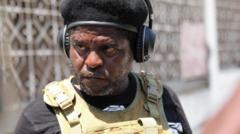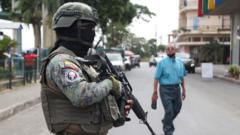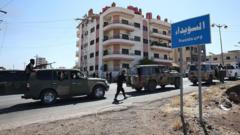Federal prosecutors have charged Jimmy Cherizier, the notorious Haitian gang leader, and accomplice Bazile Richardson for soliciting funds from the US Haitian diaspora to finance gang activities, revealing the scale of violence and humanitarian crises gripping Haiti.
US Federal Charges Against Haitian Gang Leader Barbecue Highlighting Rising Violence in Haiti

US Federal Charges Against Haitian Gang Leader Barbecue Highlighting Rising Violence in Haiti
Jimmy Cherizier, known as "Barbecue," faces criminal charges as the US seeks to curb gang violence in Haiti, offering a $5 million reward for information leading to his arrest.
US federal prosecutors have filed criminal charges against Jimmy Cherizier, widely recognized as "Barbecue," who heads a coalition of gangs controlling a substantial portion of the Haitian capital, Port-au-Prince. The indictment points towards Mr. Cherizier, along with US citizen Bazile Richardson, 48, who allegedly raised funds from the Haitian diaspora in the United States, aiming to support their gang and purchase firearms in contravention of US sanctions.
Cherizier, a former law enforcement officer currently eluding capture in Haiti, leads the gang coalition called Viv Ansanm (Live Together). The US government has placed a $5 million bounty on him for information aiding his arrest. His group has been linked to a plethora of human rights violations, including murders, kidnappings, and assaults on critical infrastructure.
"There’s a significant reason why there’s a $5 million reward for Cherizier's capture,” stated US Attorney Jeanine Pirro during a press briefing. “He is a gang leader accountable for atrocious human rights violations, including acts of violence against American citizens in Haiti.” Prosecutors have implicated him in the 2018 La Saline massacre, where 71 lives were lost, more than 400 homes were obliterated, and several women were assaulted.
Richardson, arrested in Texas last month, is identified as a naturalised US citizen with roots in Haiti, and was living in North Carolina at the time of his apprehension. Known by aliases such as Fredo and Lepe Blode, he is accused of facilitating financial influxes that were directed to gang leaders and weapon purchases.
Both individuals are said to have financially supported Cherizier's violent criminal enterprise that is exacerbating the ongoing security crisis in Haiti. Assistant US Attorney General John Eisenberg emphasized the US's determination to pursue those enabling violence and instability within the country. In May, US officials classified Viv Ansanm as a foreign terrorist organization, which has effectively governed Port-au-Prince since around 2020 but recently proclaimed itself a political party.
Cherizier faces not just US sanctions but also action from the United Nations, Canada, and Britain, which accuse him of inflaming hostilities in Haiti. Should he be captured, extradition to the US remains a possibility; however, he enjoys considerable influence on the streets, shielded by his loyalists.
Since the assassination of President Jovenel Moïse by unknown assailants in 2021, Haiti, recognized as the poorest nation in the Americas, has descended into severe economic turmoil, lacking effective political governance, and grappling with rampant gang violence. The grip of gangs in Port-au-Prince has precipitated an almost total collapse of law and order, unprecedented health service breakdowns, and a critical food security emergency.
With humanitarian conditions deteriorating, UN-backed security efforts, notably a Kenyan-led force, have struggled to reclaim control of the Haitian capital. Current UN assessments indicate that approximately 5.7 million individuals—over half of Haiti's population—are enduring acute food insecurity, alongside over one million residents who have been displaced internally amidst the turmoil.
















